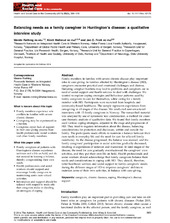| dc.contributor.author | Røthing, Merete | en_US |
| dc.contributor.author | Malterud, Kirsti | en_US |
| dc.contributor.author | Frich, Jan C | en_US |
| dc.date.accessioned | 2016-02-26T12:05:26Z | |
| dc.date.available | 2016-02-26T12:05:26Z | |
| dc.date.issued | 2015-09 | |
| dc.Published | Health & Social Care in the Community 2015, 23(5):569-576 | eng |
| dc.identifier.issn | 1365-2524 | |
| dc.identifier.uri | https://hdl.handle.net/1956/11393 | |
| dc.description.abstract | Family members in families with severe chronic disease play important roles in care-giving. In families affected by Huntington's disease (HD), caregivers encounter practical and emotional challenges and distress. Enduring caregiver burdens may lead to problems and caregivers are in need of social support and health services to deal with challenges. We wanted to explore coping strategies and behaviour patterns used by family caregivers to care for themselves, while caring for a family member with HD. Participants were recruited from hospitals and community-based healthcare. The sample represents experiences from care-giving in all stages of the disease. We conducted semi-structured interviews with 15 family caregivers in Norway. The transcribed material was analysed by use of systematic text condensation, a method for cross-case thematic analysis of qualitative data. We found that family members used various coping strategies, adjusted to the stage and progression of HD. They tried to regulate information about the disease, balancing considerations for protection and disclosure, within and outside the family. The participants made efforts to maintain a balance between their own needs in everyday life and the need for care for affected family member(s). As the disease progressed, the balance was skewed, and the family caregivers' participation in social activities gradually decreased, resulting in experiences of isolation and frustration. In later stages of the disease, the need for care gradually overshadowed the caregivers' own activities, and they put their own life on hold. Health professionals and social workers should acknowledge that family caregivers balance their needs and considerations in coping with HD. They should, therefore, tailor healthcare services and social support to family caregivers' needs during the different stages of HD to improve caregivers' abilities to maintain some of their own activities, in balance with care-giving. | en_US |
| dc.language.iso | eng | eng |
| dc.publisher | Wiley | eng |
| dc.relation.ispartof | <a href="http://hdl.handle.net/1956/11452" target="_blank">Towards improved partnerships between health professionals and family caregivers in Huntington's disease: a qualitative study</a> | |
| dc.relation.uri | http://onlinelibrary.wiley.com/doi/10.1111/hsc.12174/abstract | |
| dc.rights | Attribution CC BY-NC-ND | eng |
| dc.rights.uri | http://creativecommons.org/licenses/by-nc-nd/3.0/ | eng |
| dc.subject | caregivers | eng |
| dc.subject | chronic diseases | eng |
| dc.subject | coping | eng |
| dc.subject | Huntington's disease | eng |
| dc.subject | support | eng |
| dc.title | Balancing needs as a family caregiver in Huntington’s disease: a qualitative interview study | en_US |
| dc.type | Peer reviewed | |
| dc.type | Journal article | |
| dc.date.updated | 2015-12-30T16:57:32Z | |
| dc.description.version | publishedVersion | en_US |
| dc.rights.holder | Copyright 2014 The Authors | |
| dc.identifier.doi | https://doi.org/10.1111/hsc.12174 | |
| dc.identifier.cristin | 1181016 | |

